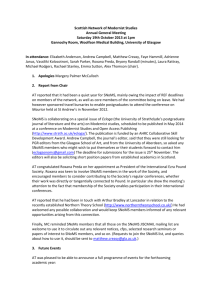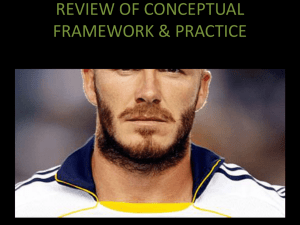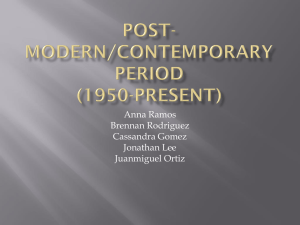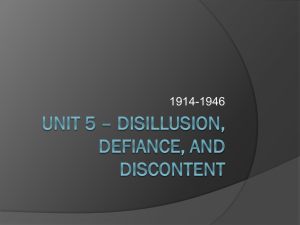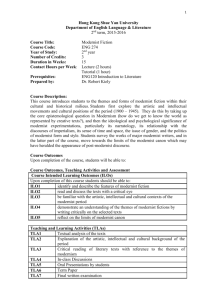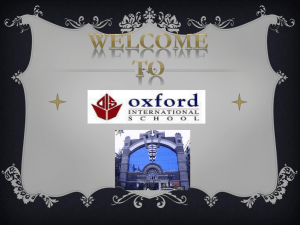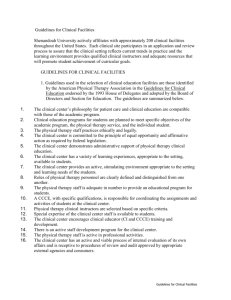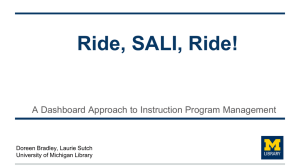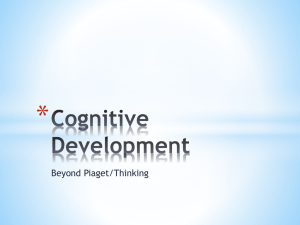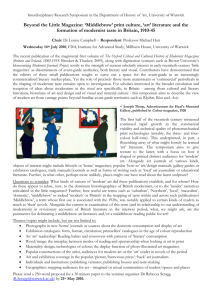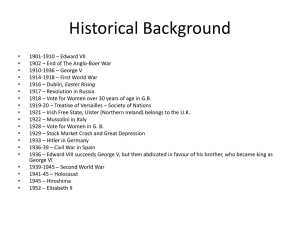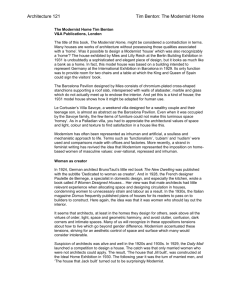Modernism team teaching application
advertisement
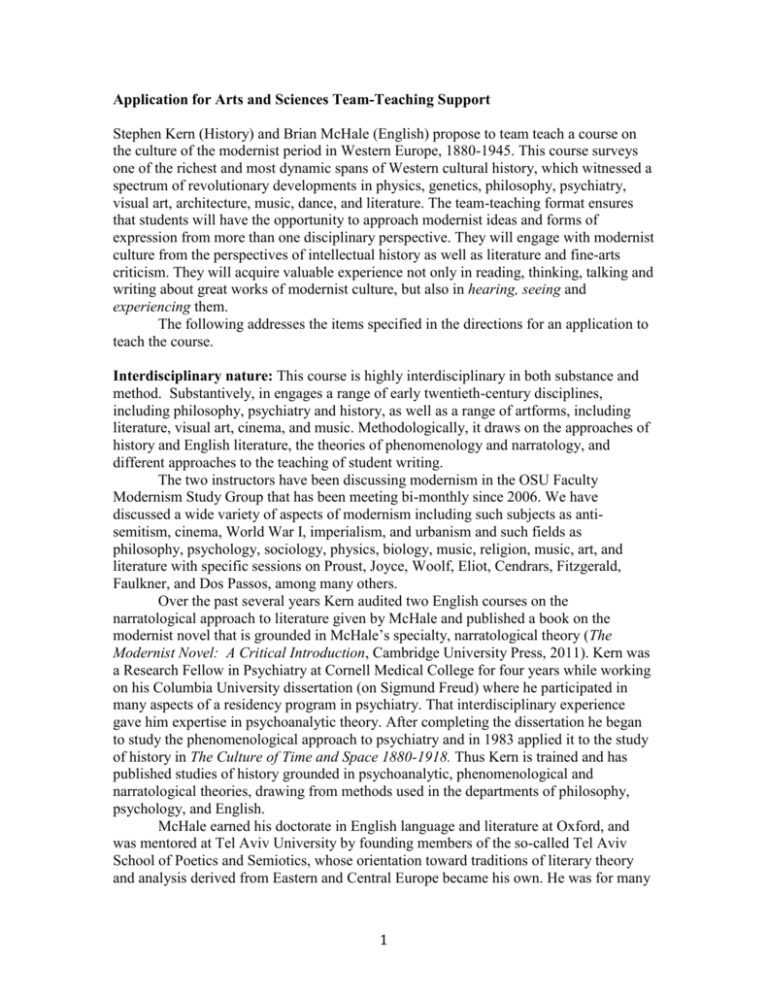
Application for Arts and Sciences Team-Teaching Support Stephen Kern (History) and Brian McHale (English) propose to team teach a course on the culture of the modernist period in Western Europe, 1880-1945. This course surveys one of the richest and most dynamic spans of Western cultural history, which witnessed a spectrum of revolutionary developments in physics, genetics, philosophy, psychiatry, visual art, architecture, music, dance, and literature. The team-teaching format ensures that students will have the opportunity to approach modernist ideas and forms of expression from more than one disciplinary perspective. They will engage with modernist culture from the perspectives of intellectual history as well as literature and fine-arts criticism. They will acquire valuable experience not only in reading, thinking, talking and writing about great works of modernist culture, but also in hearing, seeing and experiencing them. The following addresses the items specified in the directions for an application to teach the course. Interdisciplinary nature: This course is highly interdisciplinary in both substance and method. Substantively, in engages a range of early twentieth-century disciplines, including philosophy, psychiatry and history, as well as a range of artforms, including literature, visual art, cinema, and music. Methodologically, it draws on the approaches of history and English literature, the theories of phenomenology and narratology, and different approaches to the teaching of student writing. The two instructors have been discussing modernism in the OSU Faculty Modernism Study Group that has been meeting bi-monthly since 2006. We have discussed a wide variety of aspects of modernism including such subjects as antisemitism, cinema, World War I, imperialism, and urbanism and such fields as philosophy, psychology, sociology, physics, biology, music, religion, music, art, and literature with specific sessions on Proust, Joyce, Woolf, Eliot, Cendrars, Fitzgerald, Faulkner, and Dos Passos, among many others. Over the past several years Kern audited two English courses on the narratological approach to literature given by McHale and published a book on the modernist novel that is grounded in McHale’s specialty, narratological theory (The Modernist Novel: A Critical Introduction, Cambridge University Press, 2011). Kern was a Research Fellow in Psychiatry at Cornell Medical College for four years while working on his Columbia University dissertation (on Sigmund Freud) where he participated in many aspects of a residency program in psychiatry. That interdisciplinary experience gave him expertise in psychoanalytic theory. After completing the dissertation he began to study the phenomenological approach to psychiatry and in 1983 applied it to the study of history in The Culture of Time and Space 1880-1918. Thus Kern is trained and has published studies of history grounded in psychoanalytic, phenomenological and narratological theories, drawing from methods used in the departments of philosophy, psychology, and English. McHale earned his doctorate in English language and literature at Oxford, and was mentored at Tel Aviv University by founding members of the so-called Tel Aviv School of Poetics and Semiotics, whose orientation toward traditions of literary theory and analysis derived from Eastern and Central Europe became his own. He was for many 1 years an editor of the Tel Aviv School’s international journal, Poetics Today. At Ohio State he was a co-founder of Project Narrative, which he directed in 2012-14, and is a founding member and former president of the Association for the Study of the Arts of the Present (ASAP). He is the author of three monographs on postmodernist fiction and poetry, and co-editor of four “companions” to twentieth-century literature, narrative theory, experimental literature, and the American postmodern novelists Thomas Pynchon. He regularly teaches graduate and undergraduate courses on twentieth-century literature and critical theory. Kern and McHale have discussed one another’s research in progress over these years and read one another’s manuscripts. These exchanges one-on-one, in groups, and in the margins of manuscripts have enabled them to sharpen their understanding of the subject of modernism and one another’s approaches. It would be a special experience for students to hear that dialogue continue in the classroom as Kern and McHale exchange ideas about one another’s lectures on the subject of modernism. How the course will benefit students, how it will advance the participating departments' academic goals, and how it will fit into each department's curricular map: The students will be exposed to cross-disciplinary dialogue between instructors with different but compatible approaches to the same materials and will be invited to join the dialogue, modeling their own responses on the methodological give-and-take between their instructors. They will engage with sources from different disciplines and art-forms, and they will acquire a 3-D, “in the round vision” of the early-twentieth-century modernist era. Both departments, English and History, are committed to interdisciplinary thinking, to the improvement of students’ skills as critical thinkers and writers, and to exposing them to key works of the past. This course addresses all of these academic goals of the respective departments. Both English and History are committed to teaching material from this critically important period, which is the foundation of developments in the twentieth- and twenty-first centuries. This course illuminates the cultural and intellectual context of major developments of the modern period, including imperialism, the World Wars, and feminism. It ranges across a wide spectrum of forms of cultural expression, including prose fiction, poetry, drama, visual art, music, and cinema. The added value that team teaching brings to the course: Students will be exposed to different methodological approaches to a common body of modernist-era material and will be invited to apply those methods in their own thinking and writing. Writing assignments will draw on materials from both fields. Both instructors will read all papers and assign independent letter grades in light of the differing skills, standards, and objectives of their respective disciplines. For the first paper, instructors will conduct one-on-one writing tutorials with every student. The form that team teaching in the course will take: Both instructors will be present at all class-meetings. On any given day, one instructor will take the lead in lecturing or setting up the discussion, and the other will respond; that 2 exchange will open up into class discussion. Instructors will share responsibility for grading students’ writing assignments and for conducing writing tutorials (see above). Course learning goals and a plan for assessing student success in reaching them: Students will acquire specific, concrete knowledge and appreciation of one of the richest and most dynamic periods in cultural history, including some of the greatest works of modern thought and expression. They will also become conversant with the methodologies of phenomenology and poetics. Finally, they will improve their expository writing skills through focused assignments and tutorials. Assessment will include administration of a brief, ungraded pre-course essay on the subject matter of the course. At the end of the course, students will be asked to answer the same question in the light of their semester’s work. The instructors are excited at the prospect of sharing with students the discussions they have been having for their own interest over the past eight years in the Faculty Modernist Studies Group. This forum has been a high point of collegiality and friendship as well as serious scholarly exchange, and they look forward to sharing that marvelous experience with students, suitably modified for undergraduate instruction. The objects of their discussions and of this course are some of the great the cultural monuments of Western civilization. 3
